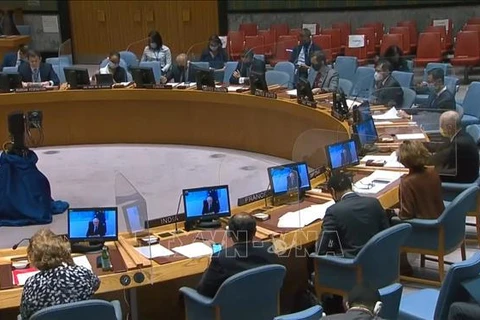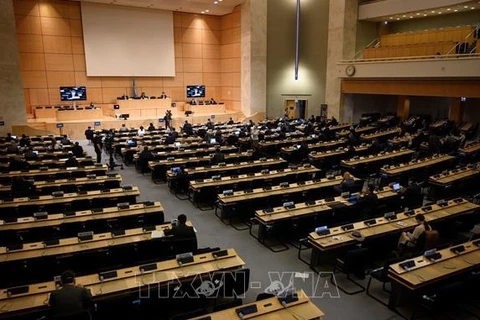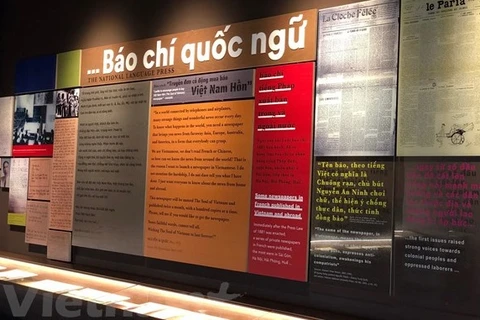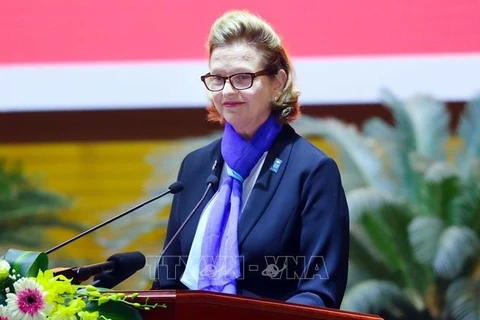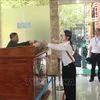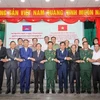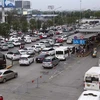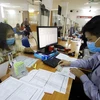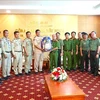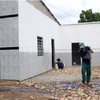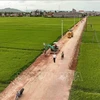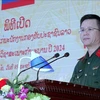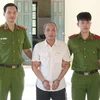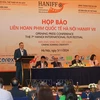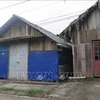Hanoi (VNA) – The Freedom House has recently issued a report which again contains prejudiced and partial assessments on internet freedom in Vietnam.
Such assessments have no valid grounds and intentionally ignore the vivid reality of internet freedom in Vietnam, as well as achievements the country has recorded in human rights over the past years.
Vietnam’s efforts in ensuring and promoting human rights have been lauded by other countries and international organisations at various cycles of the Universal Periodic Review (UPR) of the United Nations Human Rights Council (UNHRC).
The council has also regarded Vietnam as a bright spot in human development, as reflected through the implementation of millennium development goals (MDGs) on poverty reduction, and social equality and progress.
Amid the COVID-19 pandemic, the country has been praised for giving the top priority to public health.
According to the Human Development Report 2020 released by the UN Development Programme (UNDP), Vietnam has joined the ranks of countries with high human development in the world.
Between 1990 and 2019, the country’s Human Development Index (HDI) increased by almost 46 percent, which was among the highest HDI growth rates in the world, the report said.
Notably, Vietnam is one of the countries that have completed the MDGs ahead of schedule, and are working towards sustainable development goals (SDGs).
The country has made impressive progress in internet development. Statistics show about 70 percent of Vietnamese people use the internet, against the world’s average ratio of only 51.4 percent. Vietnam is among the 20 countries with the highest number of internet users.
Various social platforms have registered to operate in the country, with the most popular being Facebook, Zalo, Twitter, Instagram and Tiktok, to name just a few. Notably, Facebook has attracted up to over 65 million users in the country.
People can freely express their views and share information via the internet, especially websites and social networks. Many agencies and organisations in the political system, from the central to grassroots levels, have also utilised the internet and social networks to serve their operations, handle administrative procedures and maintain contact with residents.
They are the vivid evidences of the fact that the Vietnamese Party and State have always respected and protected the development right of each individual, as well as their rights to freedom of information and internet.
Therefore, the Freedom House’s allegation that Vietnam’s Law on Cyber Security is a tool to monitor internet use in the country is groundless.
The cyber security law is designed to make Vietnam’s cyber space healthy and protect the country’s sovereign right in the cyber space, in the context of surging trade frauds, fake news, distorted information or contents that are immoral or trigger social disturbances.
The freedom of internet and social networks in Vietnam has been exercised within the legal framework to ensure cyber security and prevent activities that take advantage of social networks to violate Vietnam’s laws, incite social unrest and create conditions for external forces to intervene into domestic matters.
Moreover, the law totally conforms to international law, specifically the International Covenant on Civil and Political Rights (ICCPR).
Article 19 of the ICCPR stipulates that “Everyone shall have the right to hold opinions without interference,” but the exercise of such rights provided for in paragraph 2 of this article carries with it special duties and responsibilities. “It may therefore be subject to certain restrictions, but these shall only be such as are provided by law and are necessary: (a) For respect of the rights or reputations of others; (b) For the protection of national security or of public order (ordre public), or of public health or morals.”
It is obvious that the Free House has deliberately ignored the ICCPR regulations, and the fact that not only Vietnam but also more than 180 other countries have issued a cyber security law or relevant rules to ensure national security.
Many countries like the US, Germany, France, the Republic of Korea and Singapore have adopted laws and clauses stipulating the strict handling of law violations in the cyber space.
The Freedom House has repeatedly made biased and prejudiced assessments on Vietnam’s internet freedom since the country issued the Law on Cyber Security. It mainly collects such information from reactionary organisations and groups that involve in activities to sabotage Vietnam.
The fabricated information aims to create false understanding on internet freedom and human rights in Vietnam, to defame the country and lower its prestige, position and role in the international arena.
Professor Vladimir Kolotov, head of the Ho Chi Minh Institute at St. Petersburg University in Russia, said the reports issued each year by Freedom House neither base on realities nor reflect the real situation of human rights in countries. It gives itself the right to accuse other countries of violating human rights and interfere into other countries’ internal affairs, he said.
It is clear that the Freedom House has no rights to intervene into internal affairs of countries. It must immediately put an end to such valueless reports./.
Such assessments have no valid grounds and intentionally ignore the vivid reality of internet freedom in Vietnam, as well as achievements the country has recorded in human rights over the past years.
Vietnam’s efforts in ensuring and promoting human rights have been lauded by other countries and international organisations at various cycles of the Universal Periodic Review (UPR) of the United Nations Human Rights Council (UNHRC).
The council has also regarded Vietnam as a bright spot in human development, as reflected through the implementation of millennium development goals (MDGs) on poverty reduction, and social equality and progress.
Amid the COVID-19 pandemic, the country has been praised for giving the top priority to public health.
According to the Human Development Report 2020 released by the UN Development Programme (UNDP), Vietnam has joined the ranks of countries with high human development in the world.
Between 1990 and 2019, the country’s Human Development Index (HDI) increased by almost 46 percent, which was among the highest HDI growth rates in the world, the report said.
Notably, Vietnam is one of the countries that have completed the MDGs ahead of schedule, and are working towards sustainable development goals (SDGs).
The country has made impressive progress in internet development. Statistics show about 70 percent of Vietnamese people use the internet, against the world’s average ratio of only 51.4 percent. Vietnam is among the 20 countries with the highest number of internet users.
Various social platforms have registered to operate in the country, with the most popular being Facebook, Zalo, Twitter, Instagram and Tiktok, to name just a few. Notably, Facebook has attracted up to over 65 million users in the country.
People can freely express their views and share information via the internet, especially websites and social networks. Many agencies and organisations in the political system, from the central to grassroots levels, have also utilised the internet and social networks to serve their operations, handle administrative procedures and maintain contact with residents.
They are the vivid evidences of the fact that the Vietnamese Party and State have always respected and protected the development right of each individual, as well as their rights to freedom of information and internet.
Therefore, the Freedom House’s allegation that Vietnam’s Law on Cyber Security is a tool to monitor internet use in the country is groundless.
The cyber security law is designed to make Vietnam’s cyber space healthy and protect the country’s sovereign right in the cyber space, in the context of surging trade frauds, fake news, distorted information or contents that are immoral or trigger social disturbances.
The freedom of internet and social networks in Vietnam has been exercised within the legal framework to ensure cyber security and prevent activities that take advantage of social networks to violate Vietnam’s laws, incite social unrest and create conditions for external forces to intervene into domestic matters.
Moreover, the law totally conforms to international law, specifically the International Covenant on Civil and Political Rights (ICCPR).
Article 19 of the ICCPR stipulates that “Everyone shall have the right to hold opinions without interference,” but the exercise of such rights provided for in paragraph 2 of this article carries with it special duties and responsibilities. “It may therefore be subject to certain restrictions, but these shall only be such as are provided by law and are necessary: (a) For respect of the rights or reputations of others; (b) For the protection of national security or of public order (ordre public), or of public health or morals.”
It is obvious that the Free House has deliberately ignored the ICCPR regulations, and the fact that not only Vietnam but also more than 180 other countries have issued a cyber security law or relevant rules to ensure national security.
Many countries like the US, Germany, France, the Republic of Korea and Singapore have adopted laws and clauses stipulating the strict handling of law violations in the cyber space.
The Freedom House has repeatedly made biased and prejudiced assessments on Vietnam’s internet freedom since the country issued the Law on Cyber Security. It mainly collects such information from reactionary organisations and groups that involve in activities to sabotage Vietnam.
The fabricated information aims to create false understanding on internet freedom and human rights in Vietnam, to defame the country and lower its prestige, position and role in the international arena.
Professor Vladimir Kolotov, head of the Ho Chi Minh Institute at St. Petersburg University in Russia, said the reports issued each year by Freedom House neither base on realities nor reflect the real situation of human rights in countries. It gives itself the right to accuse other countries of violating human rights and interfere into other countries’ internal affairs, he said.
It is clear that the Freedom House has no rights to intervene into internal affairs of countries. It must immediately put an end to such valueless reports./.
VNA

